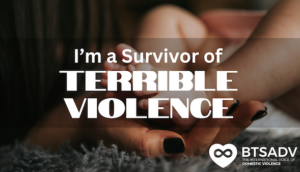Grit, by definition from the Oxford Dictionary is described as, courage and resolve; strength of character.
My mom is the epitome of grit. For a woman who went through her own struggles with a brain tumor,
surgeries, chemo, radiation, etc; she never failed at continuing to have strength along a path she didn’t
choose, it chose her.
Our relationship was strained, but we still spoke daily when I was with my abuser. Though I knew I
wouldn’t stay, my mother on the other hand didn’t, and thus was calling my friends to ask how she
could get me out.
Interestingly enough, my mother was following what, Clare Murphy addressed in her article, entitled:
How Mothers can Support Daughters Coping with an Abusive Relationship. She states:
Two rules of thumb when you support your daughter
- Firstly, she is already being controlled by her partner, so some of your instinctive reactions
might seem controlling to her and will drive a wedge between you and send her more deeply
into dependency on him. Therefore, it is not really what you say to her that’s important; it
is how you support her that matters. - Secondly, find ways to support her that keep the doors open and let her know you are
there for her in the long run. Offering a loving, kind, compassionate, concerned, and non-
judgemental presence creates trust.
As most mothers don’t, mine is just one who does, and with a pure heart. It’s an incredibly difficult road
to follow as an adult, carrying on all she did and the name behind it. After about (7) months of
having moved to another state (and away from my mom) with my abuser and my mom worrying, we
had worked out a plan to get me back home; my time had come. And she came to get me. With
everything she had been through and was going through, she managed to do these things:
⁃ Seeing and hearing come and get me. Figuring out a plan with my dad and myself.
⁃ Gathering friends to hide my vehicle.
⁃ Letting me cry and telling me I can do it cause I have the strength.
⁃ Continually telling me she was proud of me.
⁃ Being the only consistent source of sanity, with laughter, crying, or just plain anger.
My mother never judged me when I got home, she never asked for an apology, and she never made me feel
like I wasn’t worthy of a good life; coming home with not an ounce of dignity because I chose to stay for
so long, my mother gave me grace, and with that, showed me how to rebuild my strength of character, I
thought I had just plain lost. Her strength reaches far beyond most, and with any challenges thrown her way, she’s never compromised her character. Thus leaving her with grit, a trait we
often forget about. And a trait I learned from her firsthand.
Being with her, after leaving, all the nights together, and all the driving me to my new home, there was
much for me to reflect on and why I became who I am. She was my support system.
Grit is an essential factor in resilience. However, it should not be thought of as the only or even the primary
contributor to resilience in the face of adversity. Other character strengths, personality traits, lifestyle
habits, social and family environment, and even genetics contribute to how well one fare in the face of
life’s obstacles. Hard work and determination alone are neither sufficient nor necessary to achieving the
good life, although they may help in many cases. According to a Buddhist saying, “There are many paths
to the top of the mountain.” By analogy, this holds equally true in our struggle to live the good life. Grit is
one of many paths to a resilient and productive life. “How Grit may enhance subjective well-being ”By Dr.
Michael D. Matthews
For the month of May, well, any month, I’d challenge anyone looking into their hard life, whether DV was
a part or not, and say, “Who do I owe part of my best self to?” Let those people know.
I can attest that 100% of regaining my strength and dignity came from my mom.
.



